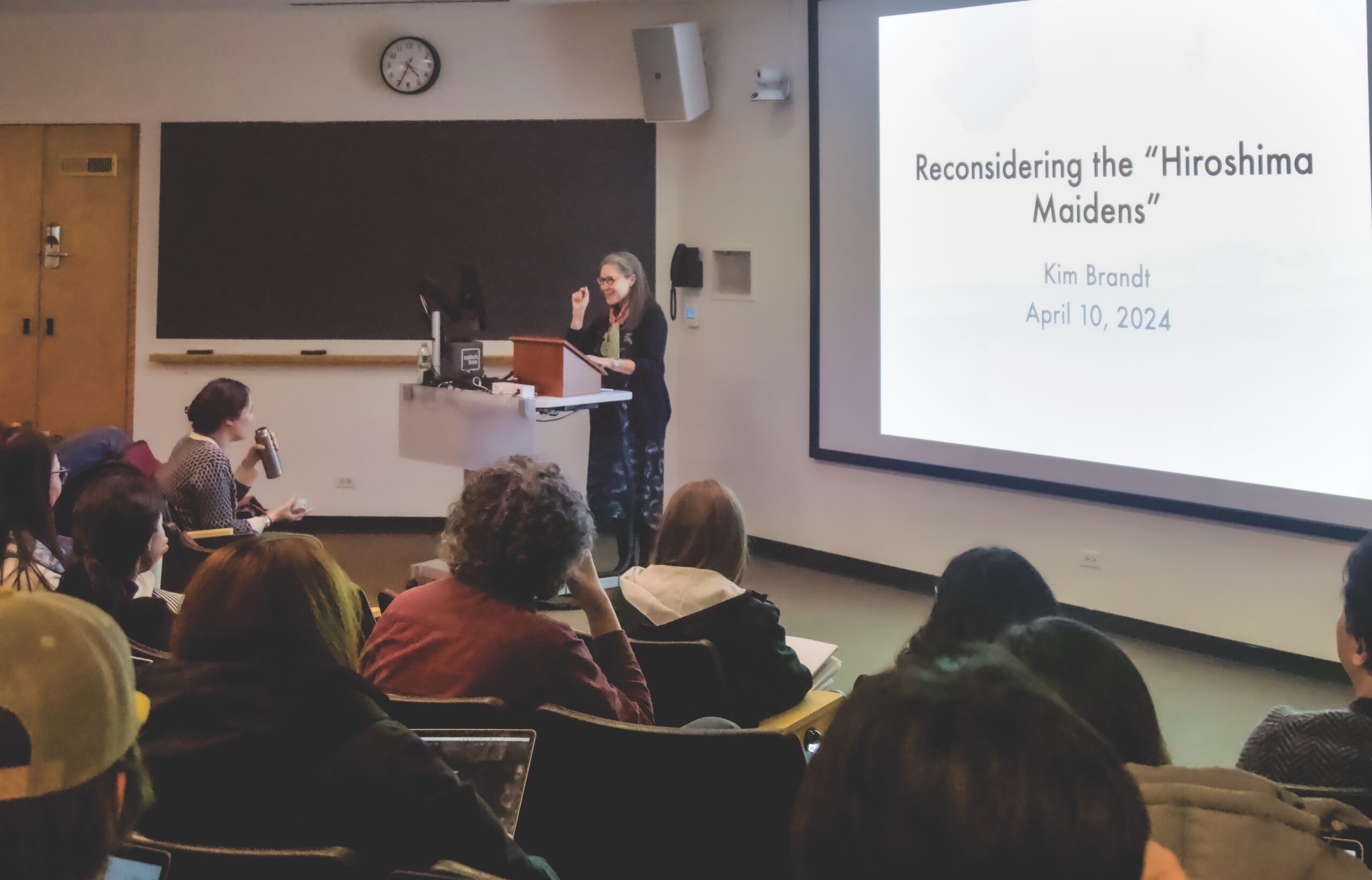Brandt talks “Hiroshima Maidens”
April 12, 2024
 Joy Wang
Joy WangOn Wednesday, Kim Brandt, a research scholar at the Weatherhead East Asian Institute, spoke about her research as she writes a book focused on post-World War II U.S.-Japanese relations. Brandt is also the academic director for the Master of Arts Program in Regional Studies: East Asia at Columbia University and was invited by Assistant Professor of History and Asian Studies Sakura Christmas and Associate Professor of Asian Studies Vyjayanthi Selinger.
Brandt’s lecture focused on the “genbaku otome,” translated in English as the “Hiroshima Maidens,” a group of 25 young women who were flown to the United States and given reconstructive surgeries ten years after the Nagasaki and Hiroshima bombings for injuries they sustained there. This chapter of U.S.-Japanese relations received considerable attention in mass media and academic scholarship, but the history has been told predominantly from an American perspective. Brandt’s lecture sought to expand the perspective surrounding that history, both pedagogically and culturally.
“[The U.S.] primarily focuses on what happened to the women here in the U.S., and how their experience was represented here,” Brandt said. “By doing that, it seems to me that [we] miss an important opportunity to understand more deeply the significance of the episode, or the relationship between Japan and the U.S., and indeed, the significance of the episode in the world [that] has anything to do with nuclear weapons, globally.”
Brandt described both the historical context and the Japanese political context of this episode of history, pointing out that the U.S.’s 1954 hydrogen bomb testings off the coast of the Marshall Islands and its post-war occupation of Japan, caused the “Hiroshima Maiden” project to accrue much criticism from the Japanese population. The American organizers of their project had their own share of reservations, seeing as the project held the potential for aggravating remaining international tensions.
“All of the organizers and participants in this 1955 project were extremely nervous at the outset,” Brandt said. “Everyone was afraid that something could go wrong in this incredibly tense atmosphere. Miraculously, it all turned out fine. Consensus in both countries in the late 1950s and beyond was a huge, big, big win—for women, for America and Japan.”
While many Americans were involved in philanthropic efforts within the project, including Quaker ministers, middle-class families, doctors and the military volunteering various services in accommodating the women for free, Brandt has a more critical perspective on their intentions, as one of the main purposes of the project was to calm the fears of U.S. citizens and prove people can survive the effects of nuclear warfare.
“Ironically, the main effect of the Hiroshima Maidens in the U.S. is to reassure them rather than alarm them [about the atomic bomb], and it did this by suggesting that people could survive nuclear warfare, both physically and emotionally,” Brandt said.
While Brandt described the Maidens’ journeys as controversial and sensationalized, she believes that it was a net positive experience for the women involved. Many of the Maidens have published memoirs and have publicly spoken about their experiences. Brandt, along with many observers of this history, observed how the surgeries vastly improved the Maidens’ mental health and quality of life even with the cosmetic surgeries being relatively modest.
Many academics and much of the American mass media have attributed this positive spin on the Maidens’ experience to their interactions with the “American way of life”—specifically, that of the white suburbia. However, Brandt argued that the value of the surgeries stemmed from the opportunity for autonomy that American life offered the women.
“To sum it up, at the heart of the Maidens’ experience was not so much familial love, although that was certainly there too, but I would argue it was a sustained encounter with two other things,” Brandt said. “One—white middle-class consumerism and American abundance—and two, an accompanying ideology that offered women limited forms of autonomy and emancipation. Autonomy and emancipation to consume, to marry for love and also to find careers in certain kinds of gendered fields.”
Professor Christmas was excited to hear about how people not formally involved in diplomacy and international relations could shape post-war relations.
“We have a very traditional understanding of what diplomacy looks like between countries. And in this case, between the United States and Japan, whether it’s through the exchange of ambassadors or economic agreements … but it can also take on this cultural form between ordinary people who want to repair these relationships between these countries and this post-war period,” Christmas said.
Terry Zhang ’24 who attended the lecture found it to be thought-provoking and informative.
“I think in general, people perceive these historical events as these big macro perspectives about various historical events such as the atomic bombing,” Zhang said. “And it really helps to see not just what happened there and how it happened, but also the various impacts that happened as Japan continually interacted with the US.”

Comments
Before submitting a comment, please review our comment policy. Some key points from the policy: